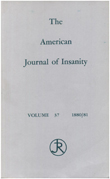Characteristics and significance of untreated major depressive disorder
Abstract
OBJECTIVE: This study sought to describe the characteristics and consequences of untreated major depressive disorder. METHOD: As part of a family study of probands with major affective disorders, raters assessed 3,119 first-degree relatives, spouses, and comparison subjects. When 2,237 (71.7%) of these individuals were reassessed 6 years later, 547 had experienced episodes of major depressive disorder in the interval. Those who had sought any form of treatment for any episode of major depressive disorder in the interval were compared, by baseline demographic characteristics and clinical features of their worst episodes of major depressive disorder, to those who had not. Individuals who had had untreated major depressive disorder were then compared, by changes in socioeconomic status and by levels of psychosocial impairment at follow-up, to a matched group with no major depressive disorder in the interval. RESULTS: The worst episodes of 313 treated individuals, compared to those of 234 untreated individuals, were characterized by older age, symptoms of the endogenous subtype, longer durations, and the presence of disruption in role function. Each of these factors contributed independently to the distinction between treated and untreated episodes. Untreated individuals experienced significant psychosocial impairment on follow-up but did not show the economic disadvantages shown elsewhere for probands who began follow-up as they sought treatment at tertiary medical centers. CONCLUSIONS: These data suggest that illness characteristics and age determine the decision to seek treatment for major depressive disorder. Untreated depression is apparently associated with long-standing psychosocial difficulties but not with serious economic consequences.
Access content
To read the fulltext, please use one of the options below to sign in or purchase access.- Personal login
- Institutional Login
- Sign in via OpenAthens
- Register for access
-
Please login/register if you wish to pair your device and check access availability.
Not a subscriber?
PsychiatryOnline subscription options offer access to the DSM-5 library, books, journals, CME, and patient resources. This all-in-one virtual library provides psychiatrists and mental health professionals with key resources for diagnosis, treatment, research, and professional development.
Need more help? PsychiatryOnline Customer Service may be reached by emailing [email protected] or by calling 800-368-5777 (in the U.S.) or 703-907-7322 (outside the U.S.).



